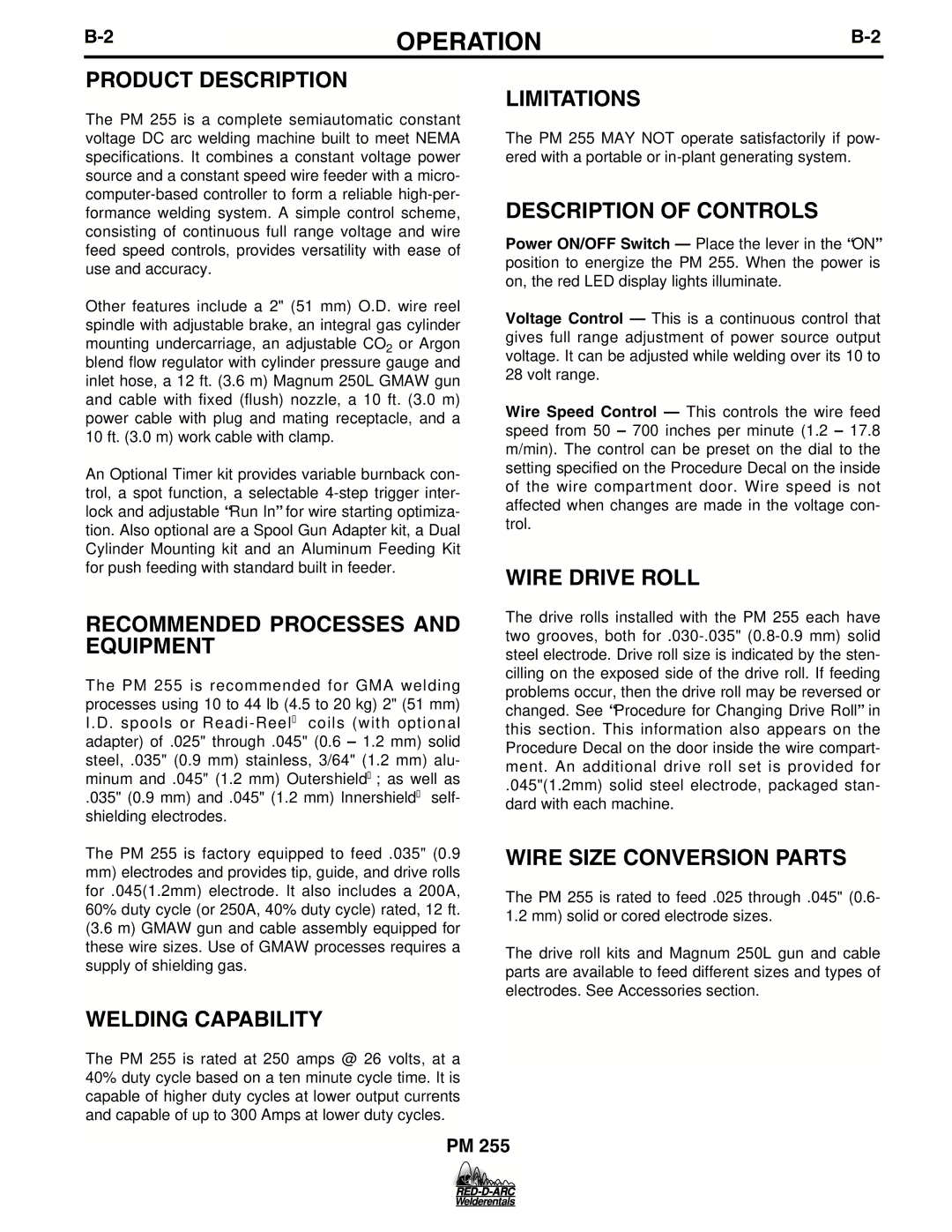
| OPERATION |
| |||
|
|
|
|
|
|
PRODUCT DESCRIPTION
The PM 255 is a complete semiautomatic constant voltage DC arc welding machine built to meet NEMA specifications. It combines a constant voltage power source and a constant speed wire feeder with a micro-
Other features include a 2" (51 mm) O.D. wire reel spindle with adjustable brake, an integral gas cylinder mounting undercarriage, an adjustable CO2 or Argon blend flow regulator with cylinder pressure gauge and inlet hose, a 12 ft. (3.6 m) Magnum 250L GMAW gun and cable with fixed (flush) nozzle, a 10 ft. (3.0 m) power cable with plug and mating receptacle, and a 10 ft. (3.0 m) work cable with clamp.
An Optional Timer kit provides variable burnback con- trol, a spot function, a selectable
RECOMMENDED PROCESSES AND EQUIPMENT
The PM 255 is recommended for GMA welding processes using 10 to 44 lb (4.5 to 20 kg) 2" (51 mm) I.D. spools or
.035" (0.9 mm) and .045" (1.2 mm) Innershield® self- shielding electrodes.
The PM 255 is factory equipped to feed .035" (0.9
mm)electrodes and provides tip, guide, and drive rolls for .045(1.2mm) electrode. It also includes a 200A, 60% duty cycle (or 250A, 40% duty cycle) rated, 12 ft. (3.6 m) GMAW gun and cable assembly equipped for these wire sizes. Use of GMAW processes requires a supply of shielding gas.
WELDING CAPABILITY
The PM 255 is rated at 250 amps @ 26 volts, at a 40% duty cycle based on a ten minute cycle time. It is capable of higher duty cycles at lower output currents and capable of up to 300 Amps at lower duty cycles.
LIMITATIONS
The PM 255 MAY NOT operate satisfactorily if pow- ered with a portable or
DESCRIPTION OF CONTROLS
Power ON/OFF Switch — Place the lever in the “ON” position to energize the PM 255. When the power is on, the red LED display lights illuminate.
Voltage Control — This is a continuous control that gives full range adjustment of power source output voltage. It can be adjusted while welding over its 10 to 28 volt range.
Wire Speed Control — This controls the wire feed speed from 50 – 700 inches per minute (1.2 – 17.8 m/min). The control can be preset on the dial to the setting specified on the Procedure Decal on the inside of the wire compartment door. Wire speed is not affected when changes are made in the voltage con- trol.
WIRE DRIVE ROLL
The drive rolls installed with the PM 255 each have two grooves, both
.045"(1.2mm) solid steel electrode, packaged stan- dard with each machine.
WIRE SIZE CONVERSION PARTS
The PM 255 is rated to feed .025 through .045" (0.6- 1.2 mm) solid or cored electrode sizes.
The drive roll kits and Magnum 250L gun and cable parts are available to feed different sizes and types of electrodes. See Accessories section.
PM 255
